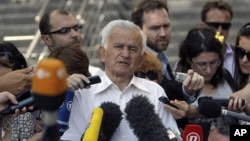The lawyer for war-crimes suspect Ratko Mladic says the former general has serious health problems and could die before the start of his trial on genocide charges. For that reason, attorney Milos Saljic said he will appeal the planned extradition of Mladic to the Netherlands-based U.N. War Crimes Tribunal.
Monday was the last day that Ratko Mladic could appeal a court decision to extradite him to the U.N. War Crimes Tribunal in The Hague.
Standing outside a court in Belgrade, Saljic told reporters he would file Mladic's appeal against extradition by mail. He said his client has suffered several strokes and is too ill to face trial in the Netherlands.
He said Mladic's health situation "is alarming" and that he demands an investigation by independent medical experts. Saljic added that Mladic is so ill that he will not be alive when the trial starts.
But prosecutors called the appeal on medical grounds "delaying tactics" and said they expected Mladic's extradition within four days.
Prosecutors said the 69-year-old former general, who was detained last week in a village north of Belgrade, is fit enough to face trial on several charges, including genocide.
Troops under his command allegedly killed up to 8,000 Muslim men and boys in the Bosnian town of Srebrenica in 1995. He also has been accused of overseeing the 43-month siege of the Bosnian city of Sarajevo when troops fired from nearby mountains, killing more than 11,000 people, including many children.
Mladic has denied wrongdoing and there have been protests against his arrest.
Protesters throwing stones and bottles clashed late Sunday with baton-wielding riot police in Belgrade. About 180 people were detained and dozens injured in the clashes.
The opposition Serbian Radical Party said the pro-Western government is bowing to pressure of the United States and European Union as it seeks EU membership.
In an interview with Dutch public broadcaster NOS, however, Serbian President Boris Tadic denied these accusations.
"This is not because of pressure of politicians from Holland, from European Union, from everywhere," he said. "This is because of us. This is because of [our] values. We are living in these region in which we have to reconcile to each other. We are living in a country in which we have to establish [the] rule of law."
Tadic also wants to know how Mladic managed to escaped detention for 16 years.
“How he organized the network of protection? For me it is very important to extend the investigation right now about who protected him. To investigate people that were involved in the protection," said Tadic. "Are they from the state structure, from the military, police? I am sure that in the beginning of his efforts he has been protected by those kind of people. For example, retired officers and the police people."
And that investigation has just begun.
Lawyer Warns Mladic Will Die Before Trial
- By Stefan Bos
